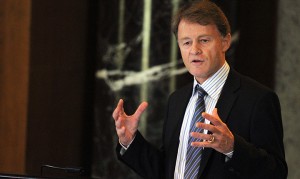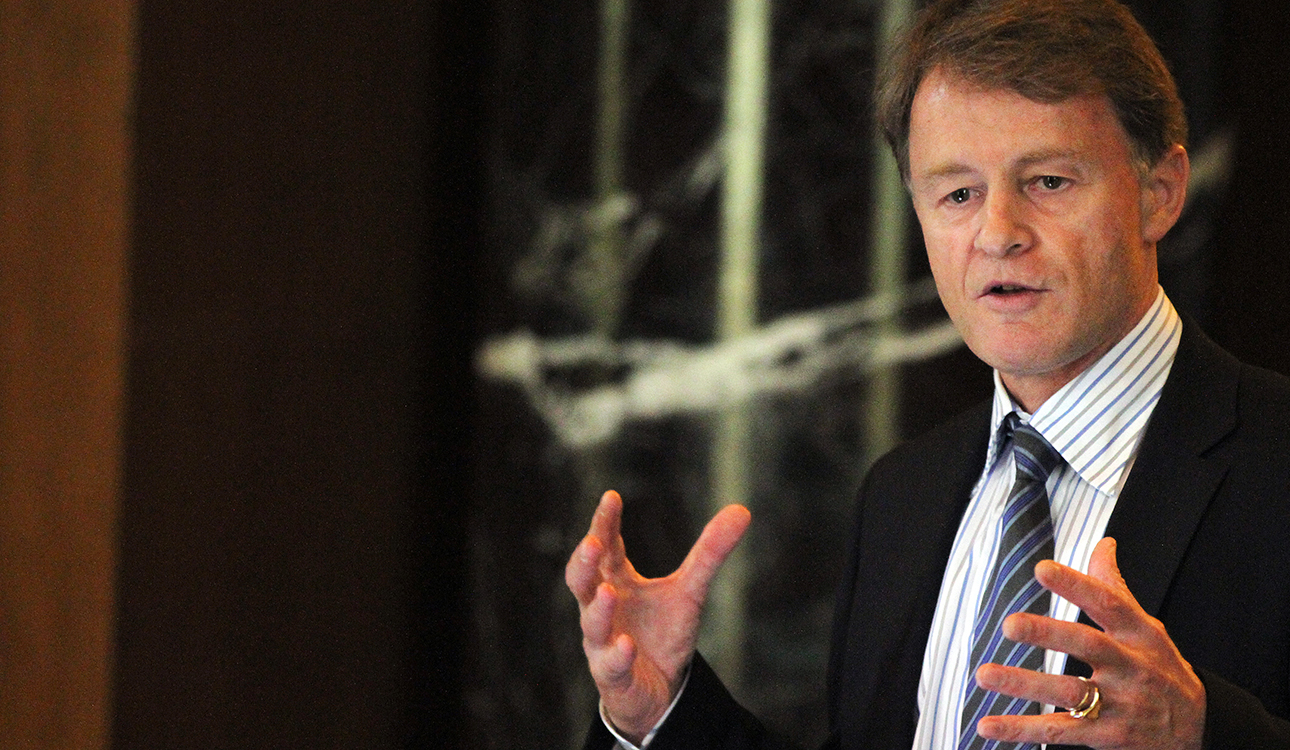
Travis Taylor | Lariat Photo Editor
By Paula Ann Solis
Staff Writer
Manuel Sager, the ambassador of Switzerland to the United States, discussed the importance of a direct democracy and trust in the government with Baylor Model United Nations students Tuesday.
“Our office heard from ambassador Sager that he would be traveling through Texas this week and we invited him to speak to a group of our students,” said Jordan Hannah, the deputy chief of staff for the office of the Baylor president, said. “We wanted to capitalize on this opportunity and he graciously accepted.”
After an introduction Tuesday in the Armstrong Browning Library and a lesson on the Baylor Sic ‘em from fellow Duke University alumnus and Baylor President Ken Starr, Sager compared key parts of Switzerland government and American policy.
Sager began by refuting the argument by some that the importance of American-European relations is on the decline because of the relative calm in Europe.
“This suggests that our value is measured by our trouble and that is not how we like to define relations between states,” Sager said.
He said Europe has taken a large role in supporting the U.S. during the recent chemical weapons crisis and that Switzerland in particular has strong ties to the U.S.
Switzerland acts as a mediator and communication channel for the United States, which does not have diplomatic relations with Cuba or Iran, Sager said. Because of this diplomatic impasse, Sager said he jokingly refers to himself as the Cuban ambassador at times.
Sager said this is one of the many ways that Switzerland carries a heavy load in international relations.
“How we define countries, like with individuals, can be described in various ways like size of power, size of wealth, values, geography, natural resources, efforts in the international community and by mistakes,” Sager said.
For Switzerland, its relatively small land mass and population of 8 million has not limited its size of power and wealth, Sager said. Instead, the Swiss have learned to globalize their market and to protect their natural resources.
While visiting Austin, Sager said he saw waste bins for recycling and others for landfills. Landfills are nonexistent in Switzerland, Sager said. According to the Federal Department of Foreign Affairs for Switzerland, direct disposal of recyclable or burnable waste in landfills was banned by law in January 2000.
“We’re world champions in recycling,” Sager said.
Another key success of the Swiss system noted highly by Sager includes the strong use of a direct democracy that allows citizens to directly vote on issues and on constitutional amendments similar to the way Texans vote on propositions.
One example of direct democracy at work in Switzerland is the 2009 minaret controversy in which minarets, prayer towers on mosques, were legally banned after the majority passed a referendum. Sager said as controversial as these referendums by the majority can be, they are a way for individuals to dictate. Though Sager noted the majority is not always right and correctives are in place to protect from policies that undermine the Swiss system.
“Hitler was elected by a democratic election, after all,” Sager said.
For students, the comparisons hit close to home when Sager discussed the Swiss approach to college. Sager said as a Swiss, he does not believe a college education is necessary for everyone and that in Switzerland, two-thirds of high school graduates do not pursue a college education. Instead, a vocational education is sought.
This type of on-the-job learning that Sager credits for the 3.6 percent of youth unemployment is growing in popularity in places like America. It was a subject touched upon by President Barack Obama during his 2009 State of the Union Address.
“I ask every American to commit to at least one year or more of higher education or career training,” Obama said in 2009. “This can be community college or a four-year school, vocational training or an apprenticeship. But whatever the training may be, every American will need to get more than a high school diploma.”
But whichever policy on education, foreign policy or direct democracy that is adopted by America, Sager said trust by the people in their government is the way to assure a brighter future. Trust that many things will pay off in the future — pension plans, expensive educations, labor relations — is vital for any government.
“If you think about it, many things are first built into the future and a trust they will still be there,” Sager said.
Cypress senior Jessica Abbey, a Model United Nations member, said she found Sager’s lecture enlightening.
“I enjoyed the unique opportunity to hear the perspective of another country that shares similar ideals to our own,” Abbey said.
Clarification: The Embassy of Switzerland requested its democratic referendum process be clarified to note that Parliament verifies that if a new law were accepted and came into force, it would not violate human rights and the international treaties and conventions signed by Switzerland. It also noted that landfills do exist, but only for waste that cannot be recycled or incinerated.






